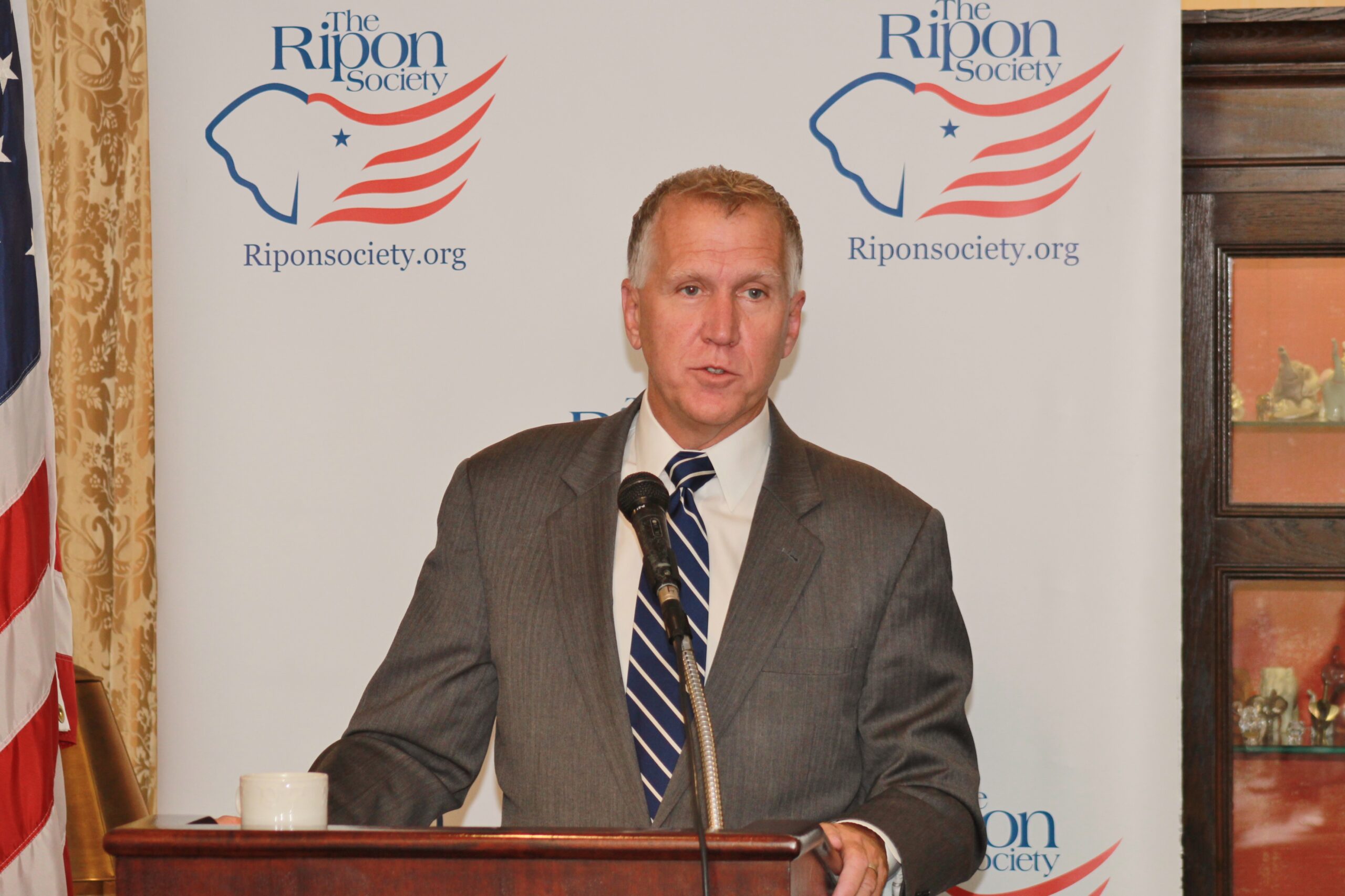 WASHINGTON, DC – U.S. Sen. Thom Tillis (R-NC) appeared before a breakfast meeting of The Ripon Society yesterday morning, delivering remarks about the economic recovery in his home state and the steps that need to be taken in Washington to launch a similar recovery across America.
WASHINGTON, DC – U.S. Sen. Thom Tillis (R-NC) appeared before a breakfast meeting of The Ripon Society yesterday morning, delivering remarks about the economic recovery in his home state and the steps that need to be taken in Washington to launch a similar recovery across America.
“I think we can learn a lot as a nation from the remarkable turnaround in North Carolina,” Tillis stated. “Meaningful regulatory reform, meaningful tax reform, providing businesses with certainty, fiscal management, removing all debt and structural deficits that we had in the State… those are things we can do here. North Carolina, in four short years, went from the lower quartile as an economic performer to the fastest growing economy in the United States.”
Tillis helped oversee this recovery as Speaker of the North Carolina House of Representatives, a position he held for four years until his election to the Senate in 2014.
“Meaningful regulatory reform, meaningful tax reform … those are things we can do here.”
“We’ve got a math problem here,” he said, referring to the politics of the Senate and the difficulty of getting anything done. “It is one thing that I think frustrates people on our side of the aisle. You need minimally 60 and generally 67 votes for anything meaningful along the lines of what we did in North Carolina.”
“I was on a committee that took a look at the kind of rules changes that myself, Cory Gardner, James Lankford, Roy Blunt, and Lamar Alexander wanted. We tried to take a look at the rules and said, ‘What can we do to make things more efficient?’ We made a few recommendations, but what I concluded was that the rules that are already on the books are probably sufficient. The question is — are we going to change our behavior and use the rules that are on the books to do a better job of forcing a vote, even a tough vote, and then moving on?”
When it comes to taking tough votes, Tillis was blunt.
“I have not had a tough vote yet,” he declared. “Last year, there was a particular vote where I had one of the senior members of the conference come up to me and say, ‘I really appreciate you taking that vote, and I know it was tough.’ I said, ‘It wasn’t tough. I don’t want you to think it was tough because we’ve got to run the government. We’ve got to fund the government. We’ve got to make sure we have the capability to take on debt. Even though the debt is out of control, you can’t shut down the government. You have to provide some sort of economic certainty because of the 800 pound gorilla that we are in the global community.’ So a lot of these votes, they may appear tough, but they’re not really tough.”
“There will be instances, probably, where I may not be able to support what some members think we need to do, but not yet. We have had to make the difficult decision on funding the government. Anyone who thinks that shutting down the government is a good idea doesn’t understand the fragile nature of the global economy today. I am not willing to play those sorts of games; I want to fix the debt and I want to get rid of deficits. But we have to do it on terms that are not creating an economic calamity. That’s what I want to do.”
Following his remarks, the North Carolina Senator was asked about tax reform and the prospects for passing a reform bill in the coming years.
“Tax reform has to do at least one and ideally two things,” he observed. “First, it needs to provide some sort of certainty so that you can predict what your out-year obligations are going to be. Second, it needs to reduce the tax burden. The first one I think we can start doing now. The second one we can’t do until we have a credible strategy for reducing the debt. So there is a side of me that says, work on the areas where you’re not worrying — and we did some of this by providing certainty, by making permanent some of the tax provisions at the end of last year, which was a pretty significant thing. But in order to reduce the tax burden, we’ve got to get the economy moving.”
And here, too, Tillis pointed to the North Carolina example on regulatory reform as a way to jumpstart economic growth.
“We put a sunset on several regulations,” he recalled. “We actually required a consultation with a legislature — something that we should be doing up here. Any net new regulations required a consultation with the legislature and a cost benefit analysis. That started creating economic activity which then, in the second year, allowed us to do tax reform.”
To view the remarks of Senator Tillis before The Ripon Society yesterday morning, please click on the link below:
The Ripon Society is a public policy organization that was founded in 1962 and takes its name from the town where the Republican Party was born in 1854 – Ripon, Wisconsin. One of the main goals of The Ripon Society is to promote the ideas and principles that have made America great and contributed to the GOP’s success. These ideas include keeping our nation secure, keeping taxes low and having a federal government that is smaller, smarter and more accountable to the people.



